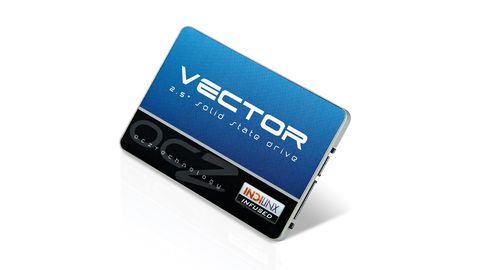TechRadar Verdict
Pros
- +
Good sequential read/write performance
- +
Can match higher capacity SSDs in some benchmarks
- +
Fastest 128GB SSD we have tested so far
Cons
- -
Loses out to higher capacity drives in other benchmarks
Why you can trust TechRadar
Our very own Jeremy Laird has already taken a look at the latest SSD offering from OCZ - the Vector, in its 256GB capacity guise - and found it to be one of the fastest 2.5-inch SSDs we've tested.
It's built using OCZ's new-from-the-bottom-up controller, the Indilinx Barefoot 3, and represents the first full fruits of the partnership between OCZ and its recently acquired Indilinx controller bods.
However, having a fast, large-capacity SSD is all well and good, but what about if your budget doesn't stretch to a 256GB drive? How much performance do you lose by saving £90 or so and going for the entry-level 128GB version of the Vector instead? Well, let's have a look and see.
Small but mighty
We said the 256GB version of the drive was one of the quickest we've tested, and it turns out the 128GB job is no slouch either. OCZ quotes a sequential read speed of 550MB/s (the same as its 256GB and 512GB siblings) but a sequential write speed of 300MB/s, which is 130MB/s slower than its two bigger brothers.
Testing the drive with the ATTO benchmark proved these figures to be bang on for read performance - the benchmark giving a score of 552MB/s - but a little conservative for the writes, where our tested drive yielded a healthy 378MB/s.
Using the AS SSD benchmark, we found that the 128GB drive is a wee bit slower than its bigger brother when it comes to sequential read performance, but amazingly it knocks the 256GB version of the Vertex4 completely out of the picture.
The tables are turned when it comes to sequential writes, but it still manages to wipe the floor with higher capacity SandForce drives, such as the 240GB Intel 520. It's pretty much the same picture when it comes to handling the small, bitty files of everyday use.
It matches both the 256GB version of the Vector and the Vertex 4 in the 4K random read performance, but all three are slightly outpaced by Samsung's 840 Pro. However when it comes to 4K random writes the 128GB Vector is quickly beaten by both the larger versions.
Benchmarks
Sequential read performance
AS SSD: Megabytes per second: Bigger is better
OCZ VECTOR 128GB: 506
OCZ VECTOR 256GB: 514
SAMSUNG 840 PRO 256GB: 516
INTEL SSD 520 240GB: 494
Sequential write performance
AS SSD: Megabytes per second: Bigger is better
OCZ VECTOR 128GB: 360
OCZ VECTOR 256GB: 494
SAMSUNG 840 PRO 256GB: 498
INTEL SSD 520 240GB: 290
4K random write performance
AS SSD: Megabytes per second: Bigger is better
OCZ VECTOR 128GB: 56
OCZ VECTOR 256GB: 74
SAMSUNG 840 PRO 256GB: 59
INTEL SSD 520 240GB: 50
Once inside the Vector, it's noticeable that the PCB is laid out in a different way to what's found inside the great majority of drives. OCZ has placed the Indilinx Barefoot 3 controller in the middle of the board with eight 8GB 25nm IMFT synchronous NAND (M2501064T048SX21) chips in a semi-circle around it, and a 256MB cache (Micron 256MB DDR3L-1600) chip sitting at the open end. The flipside of the board contains another eight NAND modules, and another 256MB cache chip.
So, how much would you be losing out in performance terms if your budget would only reach to a 128GB version of OCZ's Vector drive instead of the 256GB one? The answer is not much - this is a drive that really punches above its weight with its performance putting many a larger capacity drive in its place.
And if the 256GB drive is one of the fastest around, then the 128GB version is certainly king of all it surveys in its market segment - well, for the time being anyway.

Annual cybersecurity training isn’t working, so what’s the alternative?

How manufacturers can create a sustainable business model

Getting ChatGPT to run on a NAS is actually worth exploring — tech enthusiast puts an Nvidia RTX GPU in a 12-bay NAS powered by an AMD EPYC CPU, and the results are surprising
